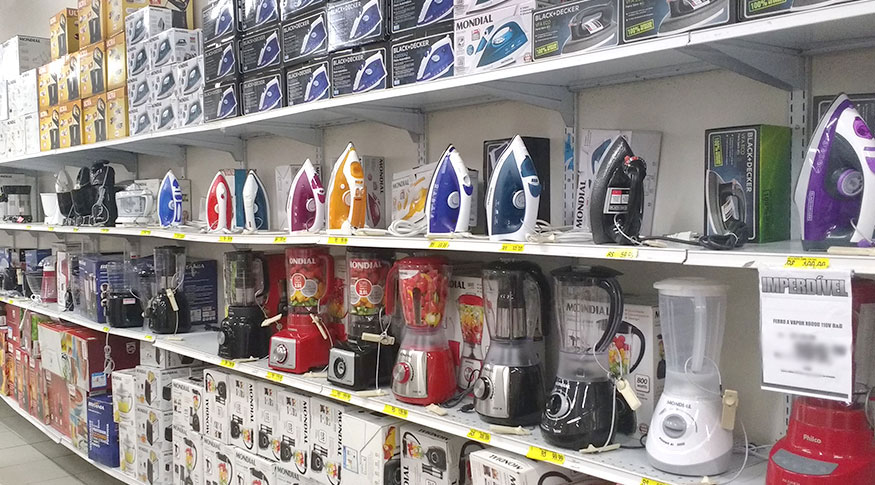Monthly Survey of Trade
Retail sales drop 0.6% in March, third negative result in 4 months
May 07, 2021 09h00 AM | Last Updated: May 07, 2021 05h01 PM

The sales in the retail trade fell 0.6% in March, after changing 0.5% in the previous month. This is the third negative figure in the last four months. The retail, which was 0.3% above the pre-pandemic level in the previous month, stood 0.3% below it in March. With the March result, the sales dropped 0.6% in the first quarter and rose 0.7% in the cumulative index in 12 months. These results are from the Monthly Survey of Trade - PMC, released today (7) by the IBGE.
The retreat was followed by seven out of eight activities investigated in the survey. The major negative impact came from the sector of furniture and household appliances, whose sales dropped 22.0% in March. Cristiano Santos, manager of the survey, explains that this activity was very influenced by the behavior of the consumers during the pandemic.
"At first, the sector rose sharply because, at home, people replaced many furnishings and house appliances. Once passed the first phase, the growth was not so expressive. Once the sales decreased, the sector used to promote sales. So, the sales in February rose and, in March, dropped," said him.
The other drops in the comparison with February were registered by the sectors of fabric, apparel and footwear (-41.5%), books, newspapers, magazines and stationery (-19.1%), other articles of personal and domestic use (-5.9%), fuels and lubricants (-5.3%), office, computer and communication material and equipment (-4.5%) and pharmaceuticals, medical and orthopedic articles, toiletries and cosmetics (-0.1%).
The only sector that increased in this comparison was that of hypermarkets, supermarkets, food products, beverages and tobacco (3.3%). The researcher explains that this segment was one of the few that benefited from the pandemic, due to its essential nature.
"In the beginning of the pandemic, it strongly increased as it absorbed the sales of other activities, mainly in those supermarket that sell house appliances, furniture and wearing apparel. After that, it shrank especially due to the food inflation," stated Santos.
In the extended retail trade, the activities of vehicles, motorcycles, parts and pieces fell 20.0% and of construction material, -5.6%, adding up to -5.3% over the previous month. It is the second month with negative rate in the first three months of the year.
Despite the drop in March, the sector of construction material is one of those that maintain above the pre-pandemic level. "Today, this activity is 13.5% above the level of February 2020. It strongly rose since the beginning of the pandemic, explained by both the emergency aid, which allowed the lower-income families to consume, and the need to build and refurbish houses. From November onwards, we had major works, like the adaptation of buildings in large cities," explained him.
Retail sales grow 2.4% over March 2020
When compared with March last year, the retail trade grew 2.4%, with the positive rates hitting four out of eight activities surveyed. Among the activities that grew, other articles of personal and domestic use (30.0%), pharmaceuticals, medical and orthopedic articles, toiletries and cosmetics (12.1%), furniture and household appliances (11.9%) and office, computer and communication material and equipment (1.0%).
On the other hand, books, newspapers, magazines and stationery (-19.7%), fabric, apparel and footwear (-12.0%), hypermarkets, supermarkets, food products, beverages and tobacco (-3.9%) and fuels and lubricants (-1.5%) pressed negatively the sector in the annual comparison.
Having grown 10.1% in this same comparison, the result for the extended retail trade mainly reflected the performance of the activities of vehicles, motorcycles, parts and pieces, which rose 27.6%, and of construction material, which grew 33.4%.
Retail drops in 22 Federation Units
In March, 22 out of 27 Federation Units reflected the drop of the national average over the previous month, highlighted by Ceará (-19.4%), the Federal District (-18.1%) and Amapá (-10.1%). In contrast, the highlights with positive rates were Amazonas (14.9%), Acre (11.2%) and Roraima (4.2%).
In the same comparison in the extended retail trade, the negative change was also recorded in 22 Federation Units, highlighting Bahia (-15.2%), Piauí (-13.2%) and the Federal District (-12.8%). Conversely, the major positive impacts came from Amazonas (15.7%), Roraima (5.3%) and Acre (1.3%).
"Furniture and household appliances dropped more intensely in some states, like Ceará. They have adopted distinct strategies, like closing stores, especially in large enterprises. Therefore, the number of open establishments changes and certain states decrease their revenue," explained the researcher.
Compared with the same month a year ago, the growth in the sales of the national retail trade was also reported in 19 Federation Units, highlighting Rio de Janeiro (7.1%), Minas Gerais (5.5%) and Santa Catarina (7.6%). In the extended retail trade, also comparing with March 2020, the advance of 10.1% was followed by 26 out of 27 Federation Units, highlighted by Santa Catarina (25.8%), São Paulo (2.9%) and Minas Gerais (9.6%). Tocantins (-1.4%) was the only state that dropped in this indicator.
More about the PMC
The Monthly Survey of Trade - PMC produces indicators to follow up the short-term behavior of the retail trade in Brazil, investigating the gross revenue of resale in formal enterprises with 20 or more persons employed and whose main activity is retail trade.
Nationwide since 2000, the PMC brings monthly results on the change of volume and nominal revenue of sales for the retail trade and extended retail trade (cars and construction material). The data are collected through a pre-filled electronic questionnaire - CASI and through a personal interview with paper questionnaire - PAPI. The complete survey can be accessed here and the results can be checked at Sidra.




















